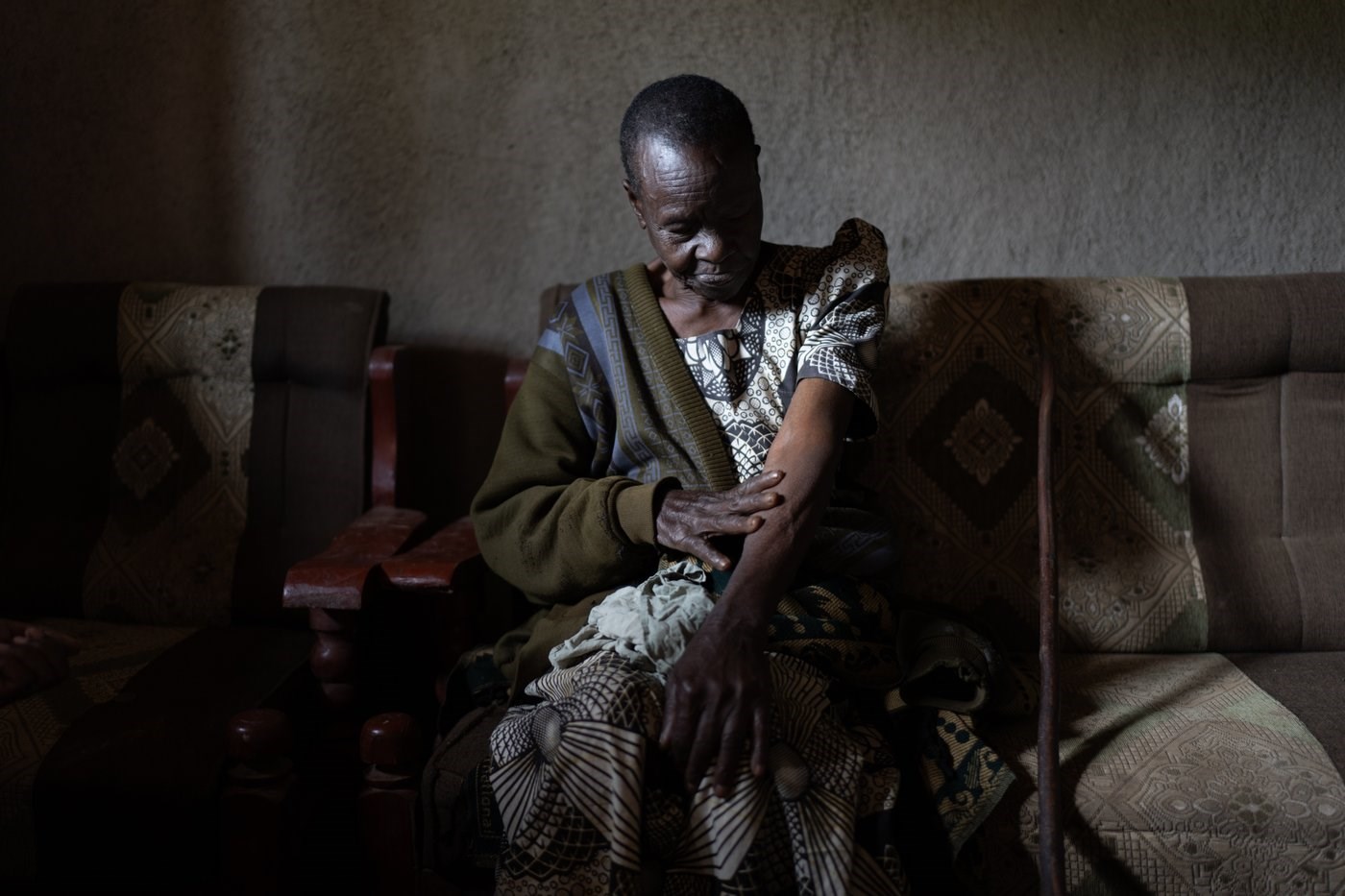
Alice Ndimuhara, 87, who has dementia, touches her arm and replies "This looks good to you?" in response to a visit by a nongovernmental organization worker to her home in Kitaburaza, Uganda, Monday, Nov. 18, 2024. (AP Photo/David Goldman)
September 02, 2025 - 12:13 AM
KITABURAZA, Uganda (AP) — In the night, when all that glows on this hilltop is the moonlight and all that moves are branches tickled by a soft breeze, the tumult returns. The old woman grows convinced her house is on fire and, panicked, drags the table, chairs and the rest of her few worldly possessions, outside. Unable to calm his mother, her son knows just one way to end it.
He locks her up.
“She yells,” the son, 62-year-old Herbert Rutabyama, says matter-of-factly. “She pounds on the door.”
Dementia’s prevalence has long been muted on this continent where lifespans have trailed the rest of the world for as long as anyone has kept track. But as the population of older people increases across Africa, experts are seeing a spike in new diagnoses, each of them bringing profound challenges to the patient and their family.
A surge of new cases of dementia is expected across Africa in the coming years as the demographic shift continues. But, already, the desperation of those caring for people living with diseases like Alzheimer’s is beginning to show.
They turn for help in a place with little to offer. In many of the languages spoken on this continent, they don’t even have a word for dementia.
This day, the crew from Reach One Touch One is making its rounds in this western Uganda village about an hour north of the Rwandan border. Nearing the woman whose middle-of-the-night visions are so unnerving, aid worker Moses Kahigwa musters as much sunniness as is splashed outside the lush valley below.
“You look good!” he coos.
The woman, 87-year-old Alice Ndimuhara, gives him an icy glare.
“This looks good to you?” she says.
It’s just past noon and Ndimuhara hasn’t had anything to eat today. She has no money. All her limbs feel weak. Her headache never seems to go away.
If not for visitors, she would’ve just stayed in bed.
“My life is just meaningless,” she says.
Her son, Rutabyama, arrives from working in the field, wearing tall black rubber boots that are coated with mud. Sweat wets his forehead.
Don’t be fooled by his mother’s sass. This, he says, is one of her good days.
It’s been a few years since she started wandering from the house and showing other signs that something was wrong. He took her to ROTOM’s clinic and they said she had dementia. His father has been diagnosed, too.
“It’s really, really hard,” he says of managing their care.
When Ndimuhara wanders off in the daytime, her son will set out to look for her, sometimes finding she’s made it as far as the next village. But when her nighttime confusion returns, he’s unsure what to do. He puts a padlock on her door and nails her window shutters closed and resists unlatching them even when she screams and pounds.
“You know better,” the mother says when the subject comes up.
It’s not entirely uncommon. The United Nations’ chief voice on the rights of older people, Claudia Mahler, issued a report in 2022 warning of elders being locked in their rooms and tied to trees in their yards, without citing the countries in which it was common.
Even for the wealthiest people in the richest places, the solutions offered for those with dementia are inadequate, amounting to salves for a disease with no cure.
Here, though, there is basically nothing. Rutabyama believes caring for his parents is his responsibility. Even if he could afford a nursing home, the country has only a handful and the closest one is a day’s drive away.
As Africa’s longevity revolution makes itself known in a thousand ways, the problems that come with it are being dumped in a place where they have lots of company.
Elders, no longer able to walk, are trapped inside with no wheelchair. But what good would it do if sidewalks are missing, streets are cratered and homes are unnavigable shacks?
Untreated cataracts leave many blind. But how do you broach surgery when even a ride to the doctor is a quandary and even a simple pair of glasses is out of reach?
Dementia brings ostracization and accusation. But who can help if belief in witchcraft is wide, cognitive expertise is sparse and the language hasn’t even a word for the diagnosis?
Rutabyama doesn’t know the answer to those questions and doesn’t defend his choice to lock his mother up.
It is another flawed response to a question with no good answer.
___
Matt Sedensky can be reached at msedensky@ap.org and https://x.com/sedensky
News from © The Associated Press, 2025